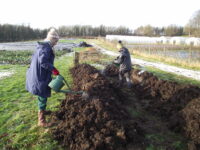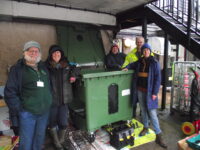With funded support from the Zero Carbon Cumbria Low Carbon Food Programme CAfS have teamed up with partners to tackle food waste in Cumbria using the unbridled power of the worm!
We are working with Anna de la Vega, who set up The Urban Worm CIC, Anna is a vermiculture expert with years of international experience delivering training and consultancy on vermiculture food waste solutions to tackle this huge global issue.

Windrow Growing Well Low Sizergh Dec 23
To date we have installed two systems at Growing Well at their Low Sizergh site, a windrow demonstration site and vermicompost bin.
A windrow is a land-based solution that can be used at an agricultural scale. Long trenches of farm muck and manure can be inoculated with Epigeic red tiger worms, small, pigmented earthworms that live on the surface of the soil.
These fantastic creatures can over a matter of a few short months transform a pile of manure into a rich material ready for spreading on pasture grass land and crops.
Growing Well with be able to utilise this nutritious worm compost – often referred to as “black gold” on their organic growing plots or make a “tea” to water plants on site.
“With less than 60 years of global topsoil left due to industrial agriculture worm farming provides the foundation for healthy food production to flourish.” The Urban Worm CIC

Vermicompost Bin at Westmorland’s Tebay North Services
We have also installed a vermicomposter and trained staff at Westmorland’s Tebay North Services. The Westmorland family are doing everything they can to reduce their food waste across all of their café sites and service stations and they are keen to find ways to both reduce their waste while supporting growers and farmers produce food sustainably.
We were joined at both sites by Garden Organic | Cumbria Master Composters, The Cumbria Master Composters spend time promoting home composting in their local community, encouraging householders to take up composting and ensuring those already composting do so effectively. It was great to have their support.
Here in Cumbria we are piloting “Vermi-Economy”. A circular, sustainable system that can be scaled up – how does it work?
- Farm Manure Windrows – Address pre-farmgate waste by providing a diversification income for Cumbrian farmers while improving soil quality and reducing the reliance on costly inorganic fertilisers.
- Vermicomposting units – Reduce hospitality food waste by developing closed loop composting systems at food retail outlets. Vermiculture can be an easy solution to reducing food waste, with the potential to generate an income and cut waste disposal costs and emissions.
- Distribute the surplus the vermicompost and liquid feed goes back to farms, growing outlets and community gardens.
We have funding to offer advice and consultancy time to SME business within Cumbria who are interested in vermiculture as a way to reduce their food waste and carbon emissions.
If you’d like to know more contact: Roe Baker [email protected]

